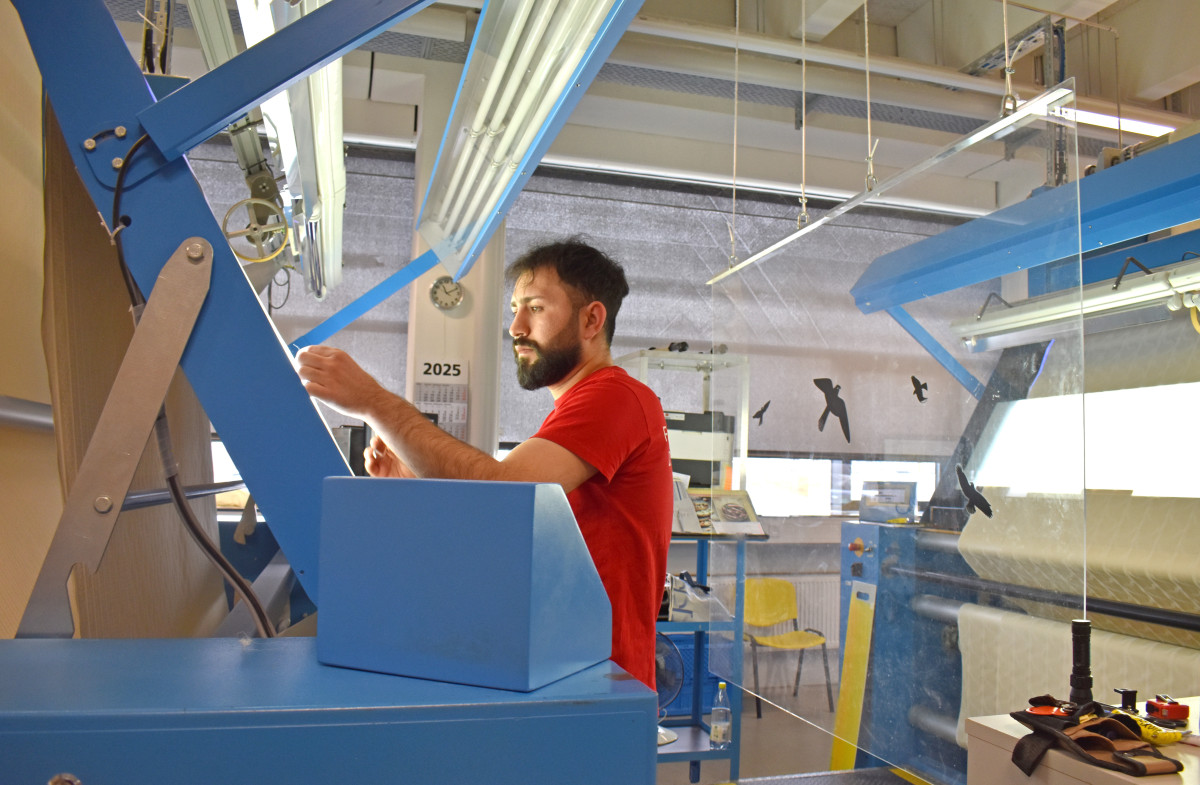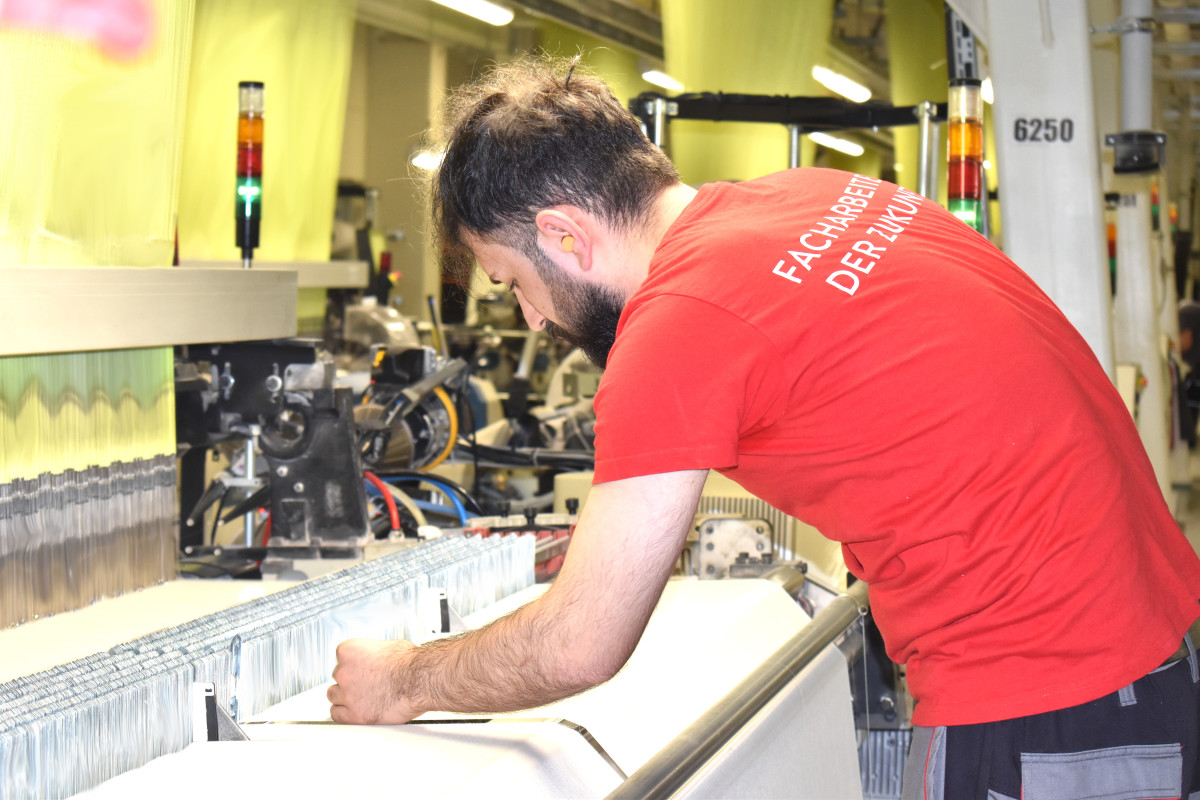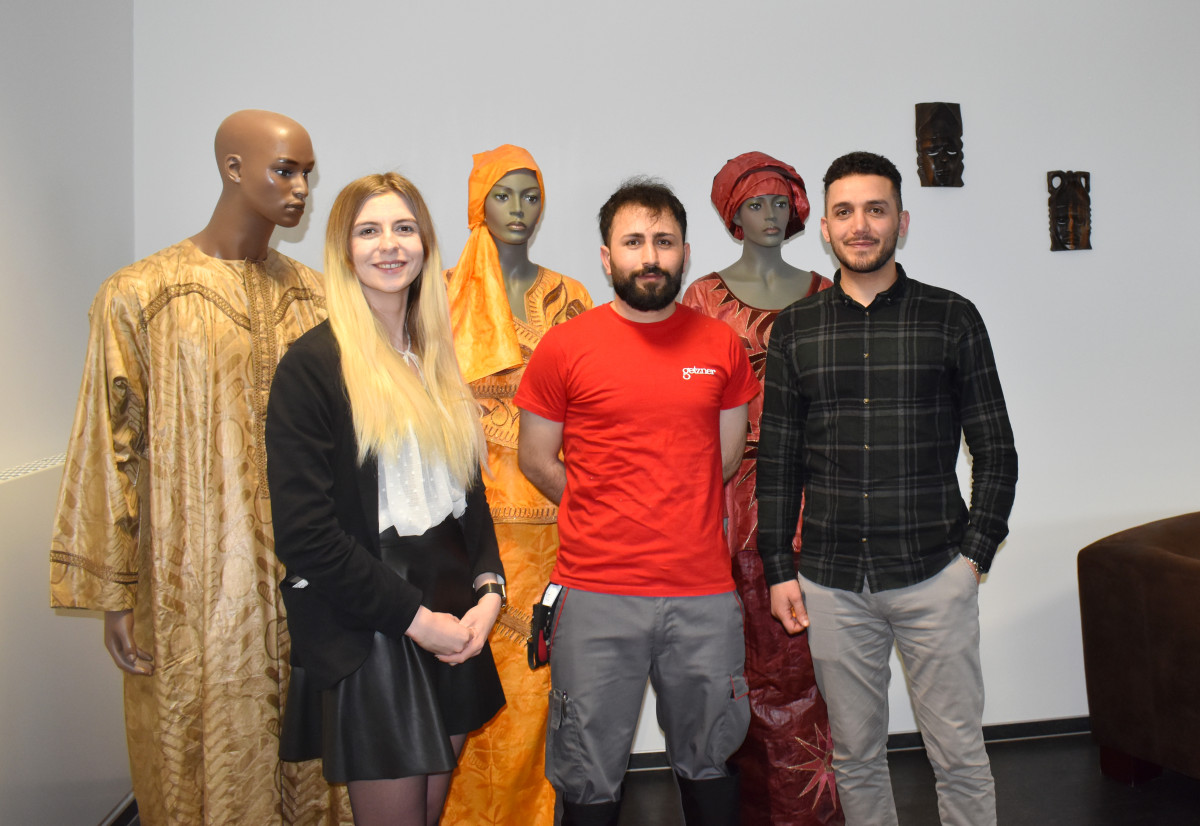Nozhdar Alomar
"I feel very comfortable in my apprenticeship. All my colleagues feel responsible when I have a question and support me. It's only sometimes difficult at vocational school. Learning all the technical terms is a challenge."
23 Jahre, Gera
Interview with Nozhdar Alomar
The first years in Germany
In 2020, Nozhdar Alomar left his home country of Iraq with his family and came to Germany, where they applied for asylum. In the first few weeks, they travelled across the country - from Bochum to Bielefeld and after a week from Bielefeld to Suhl, where the family stayed for four months until they were sent to Gera. Nozhdar Alomar was 18 years old at the time. He came to Germany as the eldest brother with his five siblings and his mother.
"The biggest problem at the beginning was the language. My mother is unfortunately ill and it was very difficult to understand the doctors at first," says Alomar.
As the eldest brother, he feels responsible for the whole family. In the two years before he joined the LAT project, he organised all the bureaucratic matters for the family, submitted applications to the social welfare office and enrolled his siblings at school.
Despite his young age, Nozhdar Alomar already had a clear idea of the first steps he needed to take to integrate into the Thuringian labour market. He initially wanted to attend a B2 course to improve his German language skills and increase his chances of finding an apprenticeship. However, he was not granted admission to the B2 course. He tried to find a job for two years. But either he failed because of the immigration authorities or the companies didn't want to hire him.
With the LAT project FIF 3.0, Nozhdar Alomar finally made progress
Mr Alomar's sister told him about the LAT project FIF 3.0 - Promotion of the Professional Integration of Foreign Skilled Workers in Gera and the project employee Yousef Yousef. She told him that he was also from Iraq and that his job was to support refugees on their way into the labour market. Joining the project finally brought the long-awaited turning point for the now 20-year-old.
At the time, Nozhdar Alomar still had a residence permit and was receiving counselling on residence law from Diakonie in Gera. However, his prospects of staying did not look very good. He and his brother are the only ones in the family who have not been granted a residence permit.
In January 2024, Mr Alomar had his first appointment with Mr Yousef, who also wanted to help him secure his residence permit. Together with the integration officer in Gera, they developed various scenarios for the next steps. In May 2024, the negative asylum decision was issued and Alomar slipped into toleration status.
Nozhdar Alomar and Yousef Yousef tried again to gain admission to the B2 language course in order to improve their chances of finding an apprenticeship. But they were still unsuccessful. So the two tried to find an apprenticeship without the certificate.
In the vocational orientation programme, they explored various occupational fields and then identified the profession of machine and plant operator as suitable. Mr Youssef had organised a factory tour at Getzner Textil Weberei GmbH for the participants of the LAT project to give the young people a better picture of such a company and the work there. Mr Alomar was also there and he could well imagine doing his apprenticeship here.
Nozhdar Alomar was very happy about the support from the LAT project, together they were able to write applications and apply for a work permit from the immigration authorities.
At Getzner Textil Weberei GmbH, skill is what counts most
Mr Yousef accompanied Mr Alomar to an initial meeting with Patricia Büchel, who is responsible for quality management at Getzner Textil Weberei GmbH and also for the trainees. They arranged a trial day and Nozhdar Alomar impressed them with his manual skills and his ability to grasp things quickly.
Yousef Yousef then accompanied his participant when the training contract was signed.
A lot happened for Nozhdar Alomar during the eight months of the project. "It also had to happen quickly because I didn't have that much time to get a better residence permit," he said.
The colleagues at Getzner support Mr Alomar with all questions, "I can call or write emails at any time," reports Mr Alomar.
The practical part of the training is going very well for Mr Alomar and he is enjoying his work. Only the vocational school is a little more difficult. "For people who don't speak German, it's a challenge with all the technical terms". Nozhdar Alomar does not receive any compensation for disadvantages in the performance assessments.
Textilweberei Getzner is aware of the problems faced by non-native speakers in theory lessons. They regularly use the VerA programme "Prevention of training drop-outs". Through this programme, trainees receive tutoring from volunteers who have worked in the relevant professional field for years.
After the start of training, he and Mr Yousef are now trying to obtain the training toleration and have also prepared the application for the BAB (vocational training allowance) together. Nozhdar Alomar is glad that he got to know Mr Yousef Yousef. "He's simply been in Germany for much longer and knows everything".
At the age of 23, Nozhdar Alomar has not yet given much thought to his future, but he is already very happy at the Getzner textile weaving mill. The company has also offered him the opportunity to complete a third year of training after his two-year apprenticeship.
We wish Nozhdar Alomar all the best for his future.


Interview with the LAT project FIF 3.0 (Yousef Yousef from the IHK Ostthüringen zu Gera)
A difficult path ends successfully: Nozhdar Alomar's path into the labour market
In January 2024, Nozhdar Alomar came to the advice of Yousef Yousef, who supports refugees in their professional orientation and job search for the IHK Ostthüringen as a project employee of the LAT project FIF 3.0. He had come on the recommendation of his younger sister.
"His younger sister was already in the project with me," reports the project worker. "She was looking for a mini-job and an internship at the time. That's when I took her into the project." After a few weeks, the sister introduced her brother: "She said that I had a brother who had successfully completed his integration course and had been looking for a job for some time."
Nozhdar Alomar came to Germany from Iraq as a young refugee together with his mother and seven siblings and was still in the asylum process at the time. "He still had authorisation to stay. The chances of a positive asylum decision were slim and we assumed that he would probably be granted tolerated stay," reports Yousef Yousef.
Nozhdar Alomar had already been to the Diakonie migration counselling service in Gera, which expected a similar outcome to the asylum procedure. "We tried to apply for a work permit from the immigration authorities via a training or employment contract so that we could start training at Getzner Textil Weberei GmbH. That worked out later," says Yousef Yousef.
Never giving up hope: Nozhdar Alomar starts his apprenticeship at Getzner Textil GmbH
Nozhdar Alomar had previously spent a long time trying to find work on his own. Initially, he wanted to attend a B2 course and then do an apprenticeship. Unfortunately, the B2 course never worked out because he was unable to get authorisation for the language course. This would only have been possible by registering as a jobseeker with the employment agency, but as the foreigners authority did not issue a work permit, this was not possible either.
"As a result, he searched in vain for a job for over two years. Unfortunately, the search was unsuccessful, either because of the employers or the immigration authorities," says Yousef Yousef, describing the difficult initial situation. But despite the many setbacks, Nozhdar Alomar held on to his hopes. In the end, he told the counselling session that he could well imagine training as a machine and plant operator. Yousef Yousef organised a tour of Getzner Textil GmbH with several participants from his project. Nozhdar Alomar also took part in the tour and gained an initial insight into the company and its processes. "I'm currently organising more company tours like this with local employers to give my participants an insight into different professions and show them how a company is structured here in Germany. This is very helpful for the professional orientation of migrants. Most of them have never experienced this anywhere before," explains the project employee.
Yousef Yousef suggested trying Getzner Textil Weberei GmbH, as the company offers a qualification programme for career changers. There were initially no vacancies for the qualification, but there were vacancies for an apprenticeship. Yousef Yousef then contacted Patricia Büchel, who is responsible for taking on and supporting trainees at the company, and Nozhdar Alomar received an invitation to an interview. After the interview, he was given the opportunity to demonstrate his practical skills during a trial working day. This was successful, as Nozhdar Alomar had great manual skills. In particular, he had the fine motor skills needed for the textile work on the machines right from the start. "He is also very patient, very independent and responsible," says Mr Yousef, describing the characteristics of the young apprentice. He was therefore offered a training contract. He has been training at Getzner Textil GmbH in Gera since 1 September 2024.
Creating opportunities: How a company overcomes barriers
Yousef Yousef explains why he considers Getzner Textil Weberei GmbH to be a good employer: "This company is a very positive role model for the fact that not all employers are only interested in certificates and that migrants get a chance even without a school-leaving certificate and B2 level if they have practical skills and an interest in the work." Mr Yousef would also like other companies to be more open to employing young, talented migrants like Nozhdar Alomar. This success story shows that it can be a win-win situation for both sides.
Nozhdar Alomar is still in counselling with the FiF project. Next, with Mr Yousef's support, he will apply for a tolerated stay for training purposes. He will then have a secure prospect of staying for the duration of his training.
For the future, Mr Yousef's main wish for his participant is that he successfully completes his training, "and I also hope that he feels at home in his new company and in the city of Gera."
Interview with Patricia Büchel from Getzner Textil Weberei GmbH
Integration and diversity: Getzner Textil focusses on inclusion in training
Getzner Textil Weberei GmbH in Gera is a subsidiary of Getzner Textil AG, one of the world's leading manufacturers of clothing damasks, fashion fabrics and technical textiles. With over 300 employees, the company is an important employer in the East Thuringia region.
Pre-study internships for prospective trainees are the norm here. The internships last between one and four days, during which those interested in a job can show off their manual skills and find out for themselves whether the job suits them. "It's important that you can communicate with people, but a language certificate is not important to us. And you learn the technical languageon the jobanyway," reports Patricia Büchel, who is responsible for recruiting trainees. With a 15% share of migrants, the company also recognises the challenges when new employees start work with limited language skills. "We work closely with the VerA foundation for our trainees. The volunteers are very good at helping with comprehension problems at vocational school, as they have worked in the field themselves for years," says Patricia Büchel.
She only accompanied the trial day with Nozhdar Alomar by chance, as a holiday replacement for the practical instructor. Mr Alomar did so well that Mrs Büchel wanted to take him on for the training year. The work placement is normally a little longer. "But he implemented everything so quickly that I knew we would try it with the apprenticeship."
Even with years of experience, the bureaucratic hurdles remain high
Getzner Textil Weberei GmbH is already familiar with the tiresome issue of residence permits. "I've already experienced it a few times, even with other trainees, how difficult it is to be hired. The immigration authorities want us to provide the training contract and we first want confirmation that the young person is authorised to work for us. One of the two is then always in a legal grey area," explains Patricia Büchel.
The management has also tried to get an appointment at the immigration office in order to obtain longer residence permits for the employees with tolerated status and reduce the administrative workload. This has always been a very arduous and time-consuming process.
Patricia Büchel feels that the cooperation with the foreigners authority is good in principle, but some of the regulations are not well thought out. "A lot of things could be simplified, even when it comes to moving from one district to another, that shouldn't be a problem," she reports.
Patricia Büchel hopes that Nozhdar Alomar gets through his training well and that his legal residency situation eases somewhat.
"I would also like him to decide to add the third year to his training programme. And that he might stay with us as an employee afterwards."

Mehr über das Projekt erfahren Weitere Praxisbeispiele ansehen